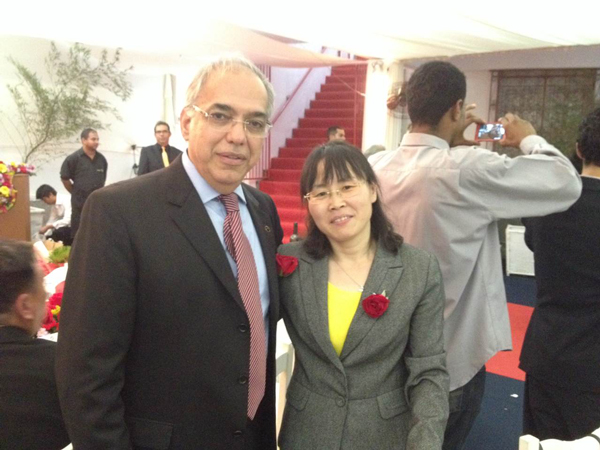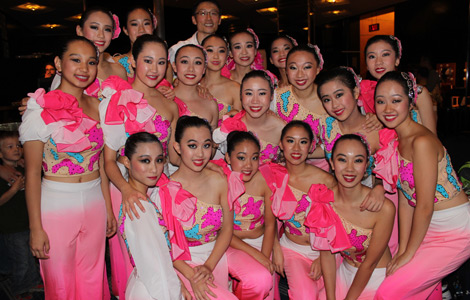Brazil can teach China about vocational training
Updated: 2014-06-30 05:00
By Zhang Fan (China Daily Latin America)
|
||||||||
 |
|
Qiao Jianzhen (right), one of the first Chinese to be awarded the Medal of Labor of Brazil, together with the representatives from Brazilian Ministry of Labor in Rio de Janeiro on June 11. Provided to china daily |
China can learn from Brazil's experience in vocational education to increase the employment rate among new graduates, said Qiao Jianzhen, the winner of Brazil's 2014 medal of labor.

Qiao, the Chinese president of Confucius Institute in the Pontifical Catholic University of Rio de Janeiro, was awarded the annual medal issued by Brazil's Ministry of Labor on June 11 for her "tireless work for the cultural communication between China and Brazil".
She is one of two Chinese receiving the honor this year and it is the first time in Brazil's history to give the honor to a Chinese.
"There are many things the two countries can learn from each other in the education system," Qiao, who played a key role in promoting local government to include Chinese language education in the curriculum of the state high school in Rio de Janeiro, told China Daily. "China has a more solid basic education and Brazil's vocational education is more complete and mature."
Qiao's words echo recent remarks by Chinese Premier Li Keqing who invited private investors and social enterprise to help develop China's vocational education in order to boost employment rates.
"In addition to the government, social entities, companies and private investors should take the lead in establishing more vocational training at different levels to integrate practical needs with teaching," said Li.
Li said the rise of the Chinese economy requires quality improvement in Chinese products and services, which relies on "a large number of skilled workers".
According to the Chinese Academy of Social Sciences, China's labor force aged 15 to 59 will amount to 900 million by the year of 2020, a figure that could later decline.
Li said the scale and level of Chinese products and services may enjoy a big improvement if the labor force can master "medium- and high-level" skills.
The Chinese government issued guidelines last February that clarified a goal of having 38.3 million vocational education graduates by 2020. About 600 universities in China may transform into vocational schools, according to the schedule.
"Just like Brazil, China is in a transition period and needs many more highly qualified workers. I think transferring 600 universities into vocational institutes can be of great help to provide enough qualified workers," Qiao said.
Brazil's first technical institute was built in 1909. After years of development, the federal government now runs more than 400 technical institutes with 150 new ones under construction. The total number tripled in the last few years.
Such increase, according to an annual report from UNESCO in 2010, is to meet the need for vocational training in areas of services, industry and agriculture. Brazil is undergoing large infrastructure projects and its natural resource industry is booming because of the Libra oil field, the country's largest oil find discovered last year.
"Brazil's vocational education allows the involvement of private enterprises and companies which can help train the workers they need in the future. Such an arrangement guarantees that students can find jobs much more easily," Qiao said.
"Many Chinese students find there is a gap between what they learned and what society needs after they graduate. There are many good students but they lack professional training. This is where China can learn from Brazil," she added.
fanzhang@chinadailyusa.com

 Silicon Valley rally calls on Fox News to fire Beckel
Silicon Valley rally calls on Fox News to fire Beckel
 Talent competition
Talent competition
 BYD's green bus in test ride
BYD's green bus in test ride
 Look who's two, Xiao Liwu!
Look who's two, Xiao Liwu!
 Philadelphia Orchestra continues China ties
Philadelphia Orchestra continues China ties
 Chinese, US naval hospital ships conduct exchange
Chinese, US naval hospital ships conduct exchange
 High rent pressures NYC Asian eateries
High rent pressures NYC Asian eateries
 Artists advocate for environmental protection
Artists advocate for environmental protection
Most Viewed
Editor's Picks

|

|

|

|

|

|
Today's Top News
Chinese antitrust agency probes Microsoft
Safety concerns Chinese communities in US
BYD's green bus in test ride
Top 'tiger' caged by graft probe
Ex-security chief Zhou Yongkang under probe
Microsoft probed for monopoly
4 charged for murdering student
Prudence urged over solar dispute
US Weekly

|

|







